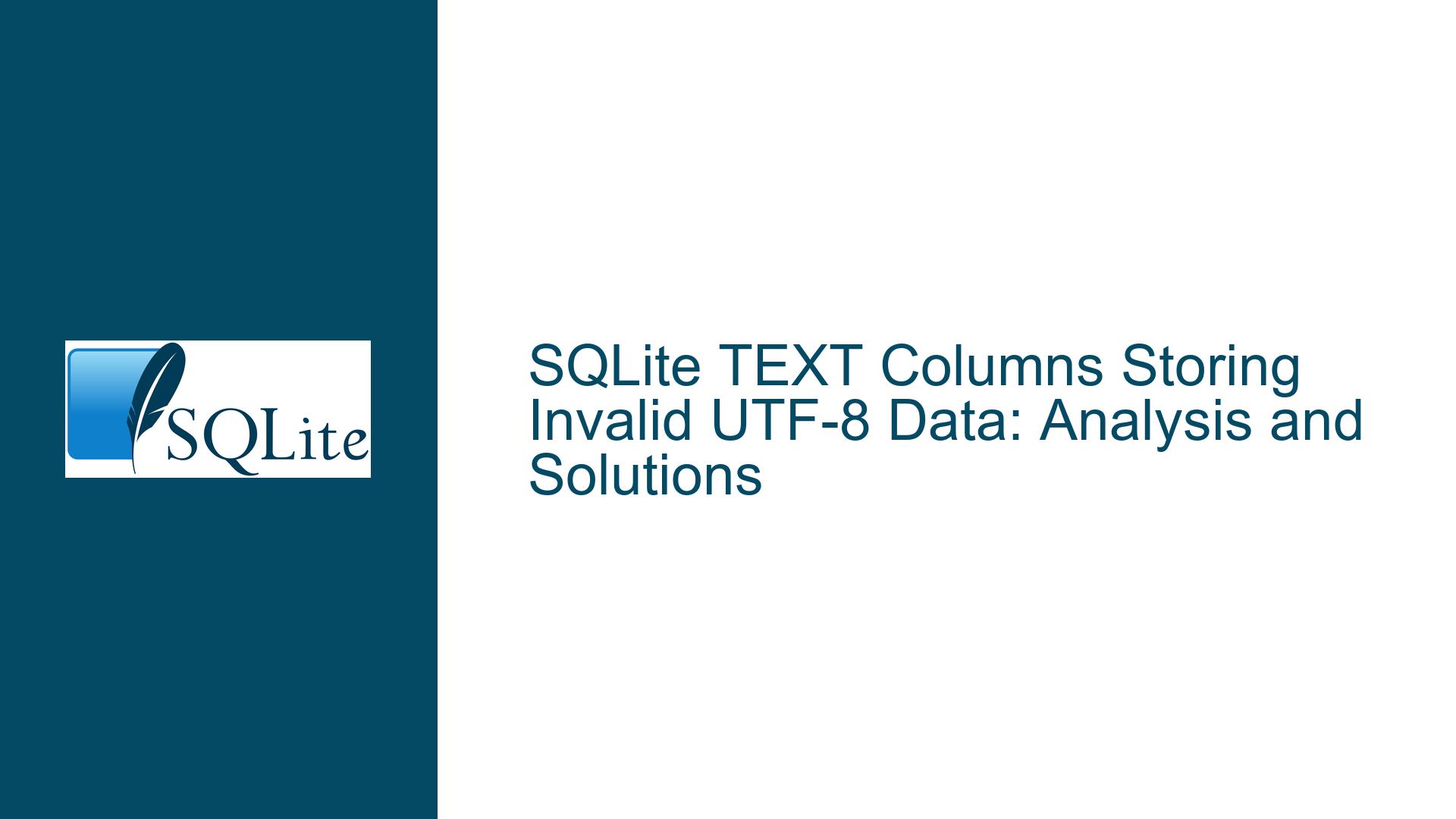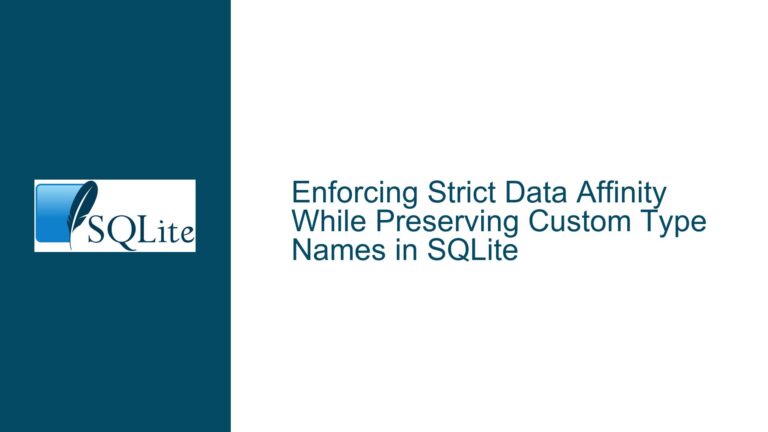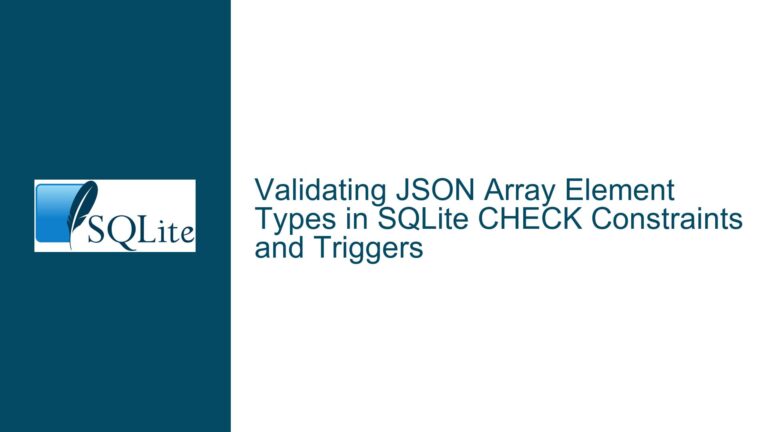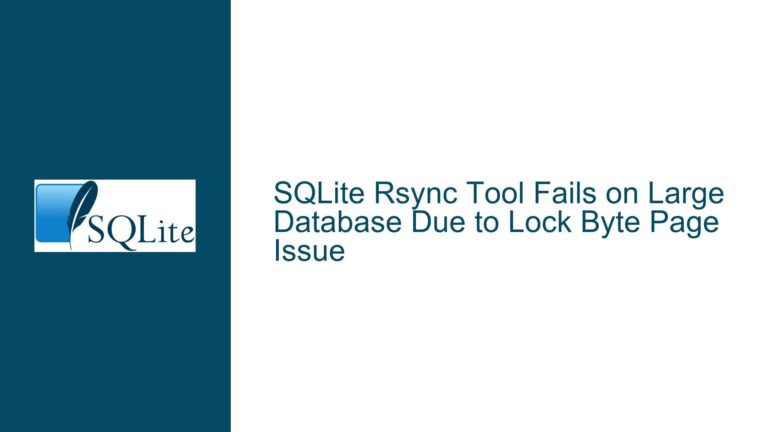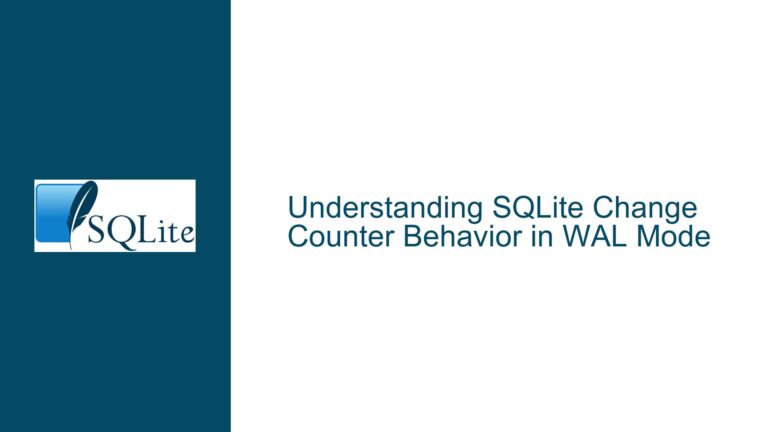SQLite TEXT Columns Storing Invalid UTF-8 Data: Analysis and Solutions
SQLite TEXT Columns Accepting Non-UTF-8 Binary Data
SQLite is a lightweight, serverless database engine that is widely used for its simplicity and flexibility. One of its core features is its dynamic type system, which allows for a wide range of data to be stored in columns regardless of their declared type. However, this flexibility can lead to unexpected behavior, particularly when dealing with TEXT columns and UTF-8 encoding.
In SQLite, TEXT columns are intended to store text strings encoded in the database’s specified encoding, which is typically UTF-8, UTF-16BE, or UTF-16LE. Despite this, SQLite does not enforce that the data stored in TEXT columns is valid according to the specified encoding. This means that it is possible to store binary data, including invalid UTF-8 sequences, in a TEXT column. This behavior can lead to confusion and potential issues when the data is retrieved and processed by applications that expect valid UTF-8 text.
For example, consider the following SQLite commands:
sqlite> PRAGMA encoding;
encoding
--------
UTF-8
sqlite> CREATE TABLE test_table (
...> some_text text NOT NULL,
...> CHECK(typeof(some_text) == 'text')
...> );
sqlite> INSERT INTO test_table VALUES (x'ff' || 'bork');
sqlite> SELECT typeof(some_text), some_text FROM test_table;
typeof(some_text) some_text
----------------- ---------
text �bork
In this example, the some_text column is declared as TEXT, and a CHECK constraint ensures that the type of the inserted value is ‘text’. However, the inserted value x'ff' || 'bork' contains a binary prefix (x'ff') that is not valid UTF-8. Despite this, SQLite accepts the value and stores it in the TEXT column. When the value is retrieved, it is still treated as TEXT, but the binary data causes display issues and potential errors in applications that expect valid UTF-8.
This behavior is not a bug in SQLite but rather a consequence of its design philosophy. SQLite does not validate the encoding of TEXT values, relying instead on the application to ensure that the data is valid. This approach can be problematic, especially when dealing with data from untrusted sources or when migrating data between systems with different encoding requirements.
SQLite’s Handling of BLOB to TEXT Conversion and Encoding
The core issue arises from SQLite’s handling of BLOB to TEXT conversion and its interpretation of encoding. When a BLOB is concatenated with a TEXT value using the || operator, SQLite converts the BLOB to TEXT by interpreting the binary data as a string in the database’s encoding. However, this conversion does not validate the binary data to ensure it is valid UTF-8. As a result, invalid UTF-8 sequences can be stored in TEXT columns.
The SQLite documentation states that TEXT values are stored using the database encoding (UTF-8, UTF-16BE, or UTF-16LE). However, it does not explicitly state that SQLite will validate the encoding of TEXT values. This lack of validation can lead to situations where TEXT columns contain data that is not valid according to the specified encoding.
For example, consider the following SQLite commands:
sqlite> INSERT INTO test_table VALUES (x'ff' || 'bork');
sqlite> SELECT typeof(some_text), some_text FROM test_table;
typeof(some_text) some_text
----------------- ---------
text �bork
In this case, the binary data x'ff' is concatenated with the TEXT value 'bork'. SQLite converts the binary data to TEXT by interpreting it as UTF-8, but since x'ff' is not a valid UTF-8 sequence, the resulting value is not valid UTF-8. Despite this, SQLite stores the value in the TEXT column and treats it as TEXT when retrieved.
This behavior is consistent with SQLite’s design philosophy, which emphasizes flexibility and minimal overhead. However, it can lead to issues when the data is processed by applications that expect valid UTF-8 text. For example, when the data is retrieved using a higher-level language, it may result in errors or unexpected behavior:
row.get_raw(0) = Text([255, 104, 101, 108, 108, 111, 44, 32, 98, 48, 114, 107])
row.get::<_, String>(0) = Err(FromSqlConversionFailure(0, Text, Utf8Error { valid_up_to: 0, error_len: Some(1) }))
In this example, the Rust SQLite library attempts to convert the retrieved value to a UTF-8 string but fails because the value contains invalid UTF-8 sequences. This highlights the importance of ensuring that TEXT columns contain valid UTF-8 data, especially when working with applications that expect valid text.
Ensuring Valid UTF-8 in SQLite TEXT Columns
To address the issue of invalid UTF-8 data in SQLite TEXT columns, it is necessary to implement additional validation at the application level. SQLite does not provide built-in mechanisms to enforce UTF-8 validity, so the responsibility falls on the application to ensure that the data is valid before inserting it into the database.
One approach is to use a user-defined function (UDF) to validate the UTF-8 encoding of TEXT values before inserting them into the database. This function can be used in a CHECK constraint to ensure that only valid UTF-8 text is stored in TEXT columns. For example:
CREATE TABLE test_table (
some_text text NOT NULL,
CHECK(validate_utf8(some_text))
);
-- Assuming a UDF validate_utf8 is defined in the application
In this example, the validate_utf8 function would be implemented in the application code and registered as a UDF in SQLite. The function would check that the TEXT value is valid UTF-8 and return a boolean indicating whether the value is valid. The CHECK constraint ensures that only valid UTF-8 text is inserted into the some_text column.
Another approach is to use a trigger to validate the UTF-8 encoding of TEXT values before they are inserted or updated. This approach can be useful when the application cannot be modified to include UDFs or when the validation logic needs to be enforced at the database level. For example:
CREATE TRIGGER validate_utf8_trigger BEFORE INSERT ON test_table
FOR EACH ROW
BEGIN
SELECT RAISE(ABORT, 'Invalid UTF-8 text')
WHERE validate_utf8(NEW.some_text) = 0;
END;
In this example, the validate_utf8_trigger trigger checks the UTF-8 validity of the some_text column before inserting or updating a row. If the value is not valid UTF-8, the trigger raises an error and prevents the operation from completing.
It is also important to consider the encoding of data when migrating between systems or when working with data from external sources. In some cases, it may be necessary to convert the data to a valid encoding before inserting it into SQLite. For example, if the data is in a different encoding (e.g., ISO-8859-1), it should be converted to UTF-8 before being stored in a TEXT column.
Finally, it is worth noting that other database systems, such as PostgreSQL and MySQL, enforce UTF-8 validity in TEXT columns by default. This can lead to differences in behavior when migrating data between systems. For example, PostgreSQL will reject invalid UTF-8 sequences with an error:
postgres=# INSERT INTO foo VALUES (E'\xff' || 'test');
ERROR: invalid byte sequence for encoding "UTF8": 0xff
Similarly, MySQL and MariaDB will reject invalid UTF-8 sequences when the database is configured to use UTF-8 encoding:
MariaDB [mydatabase]> INSERT INTO foo VALUES (X'ff');
ERROR 1366 (22007): Incorrect string value: '\xFF' for column `mydatabase`.`foo`.`some_txt` at row 1
In contrast, SQLite does not enforce UTF-8 validity, which can lead to unexpected behavior when working with data that is not valid UTF-8. Therefore, it is important to implement additional validation when working with TEXT columns in SQLite to ensure that the data is valid and consistent with the expected encoding.
In conclusion, while SQLite’s flexibility allows for a wide range of data to be stored in TEXT columns, it also requires careful handling to ensure that the data is valid and consistent with the expected encoding. By implementing additional validation at the application level, it is possible to prevent issues related to invalid UTF-8 data and ensure that TEXT columns contain only valid text.
